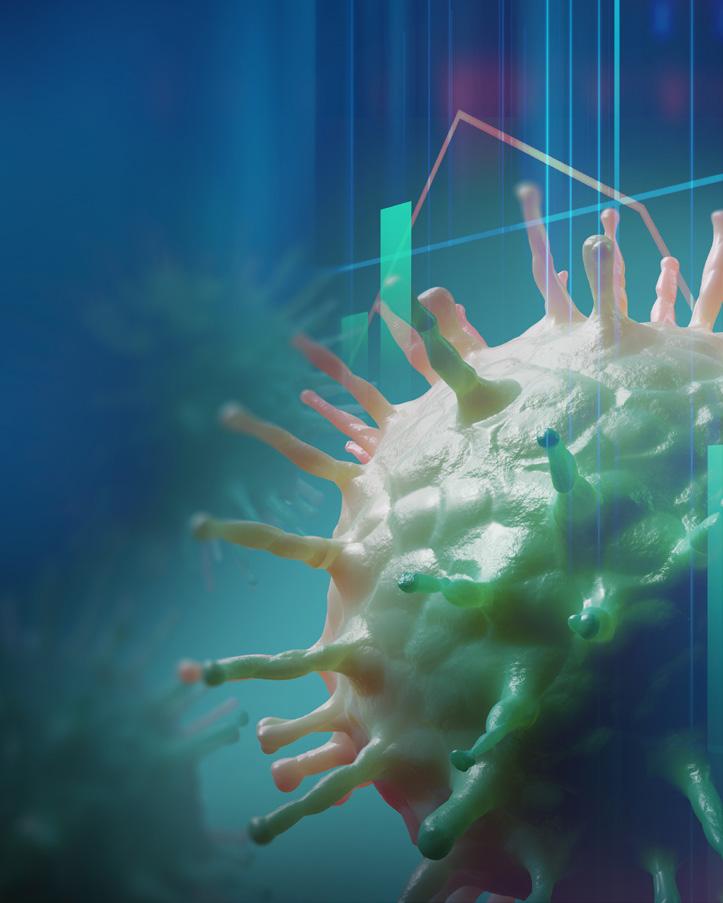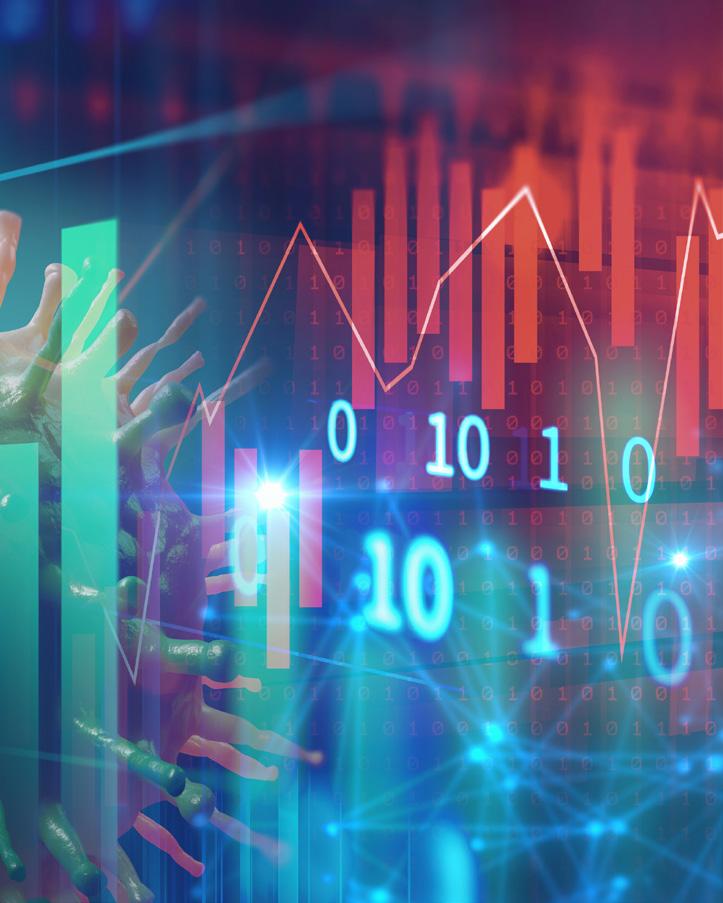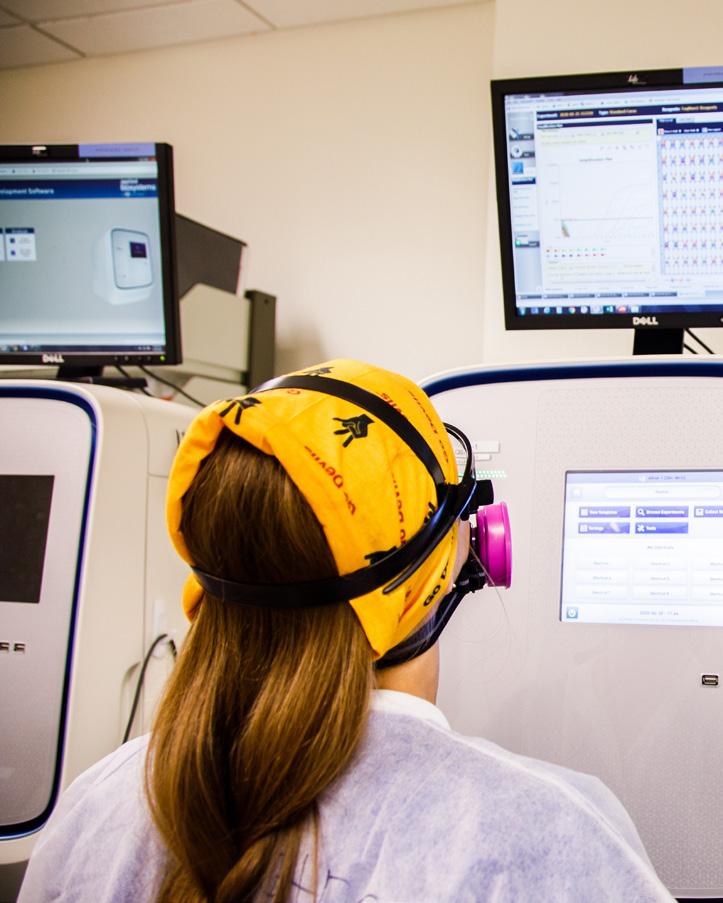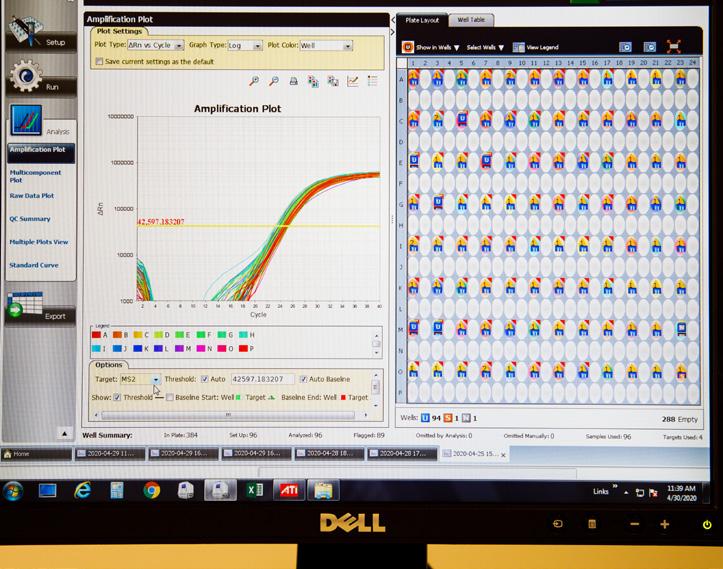
5 minute read
02: Providing powerful data and trusted expertise
The uncertainty brought about by the pandemic highlighted the need for reliable, trustworthy information. ASU rose to the occasion, emerging as a leading provider of data about the coronavirus and its rapid spread in Arizona. Researchers also contributed their time and expertise to educate the public about the latest science and clear up misconceptions about vaccines.
ASU emerged as a go-to source of reliable, trustworthy pandemic information on all fronts — interfacing with the public, media and government agencies.

Delivering data straight to your screen
The COVID trends dashboard on the ASU Biodesign Clinical Testing Laboratory website provides daily metrics on vaccines, testing, clinical outcomes for Arizona and the United States, and the lab’s own testing volume. Graphs help visitors visualize the data and better understand the magnitude of COVID-19’s impact in Arizona. The statewide data are shown both cumulatively and broken down by county. To put Arizona into context, U.S. charts offer state-to-state comparisons. Google searches, media outlets and social community pages are top traffic sources pointing users to the site. As a result of the clinical testing pages, Biodesign’s website has seen 300% more users compared to last year, ranking it in the top 14 sites for ASU.
Keeping the press and public informed
As Arizona became a virus hotspot in summer 2020, people within and without the state looked to local leaders for answers. Biodesign Institute Executive Director Joshua LaBaer emerged as a trusted scientific expert, holding weekly press conferences to provide insight and knowledge to the press and public. Attended by local, national and international news outlets, the conferences provided LaBaer a platform to advocate for public safety measures, advance understanding of complex science and promote testing and vaccination.

Combating disinformation in communities of color
People of color make up more than half of reported COVID-19 cases in the U.S., according to the National Institutes of Health. In an effort to curb infections among these disportionately affected communities, researchers from ASU, along with colleagues from University of Arizona, Northern Arizona University and Mayo Clinic, formed a consortium to combat disinformation and promote awareness among those hardest hit. Through focus groups and coordination with health, faith and community organizations, the consortium aims to increase vaccination, reduce disinformation and promote preventive measures.
Connecting scientists around the globe to model the pandemic
Thousands of scientists worldwide have been working around the clock to develop computer models to better understand COVID-19 and its rapid spread. To fast-track research and discovery, ASU launched the Network for Computational Modeling in Social and Ecological Sciences (CoMSES Net), an international clearinghouse for computer models where scientists can harness the power of collaboration at a critical time. CoMSES Net provides a digital platform for scientists to scrutinize and fine tune the assumptions and algorithms of models projecting the course of the pandemic in hopes of curbing its devastating spread.

Reaching out to infected individuals
Case investigation is the first step in the contact tracing process. ASU leads a team of volunteer case investigators who interview people in Maricopa County diagnosed with COVID-19 to identify whom they have been in contact with and collect information that helps track the spread of the virus. They also provide public health guidance and share resources available to help people in isolation. By the end of March 2021, ASU case investigators had conducted over 17,000 interviews and closed nearly 36,000 cases.
By the end of March 2021, ASU case investigators had conducted over 17,000 interviews and closed nearly 36,000 cases.
Revealing the impact of social distancing and masks
Social distancing curbed the pandemic, but plunged the nation into recession. As a result, states began reopening their economies in May 2020. But what would be the toll on human life? The answer came in a collaborative research study — from ASU, the University of Florida Gainesville, the University of New South Wales and Harvard Medical School — that showed early termination of strict social distancing measures could trigger a devastating second wave of COVID-19. The simulations accurately predicted that terminating strict social distancing by the end of April 2020 would result in a significant rebound of COVID-19 as early as July.
Another ASU research study, published in the Journal of Infectious Disease Modeling, revealed that if most people consistently wore masks in public (even homemade face coverings), the result would be a significant reduction in community transmissions of COVID-19 and decrease in peak hospitalizations and deaths. The research offers insight into how to reduce the spread of the virus while still functioning as a society.

Enahoro Iboi is one of the lead authors of the research study on social distancing and a graduate student in the School of Mathematical and Statistical Sciences.

Building community resilience through interactive tools
From a dashboard that tracks key metrics on Arizona job loss and other economic indicators to a robust hospital resources mapping tool, ASU’s Knowledge Exchange for Resilience site provides facts at leaders’ fingertips. The site also offers an on-demand webinar on adaptive leadership, among other features.
New resource hub on COVID-19 tests worldwide
ASU’s Decision Theater teamed up with the ASU College of Health Solutions and the World Economic Forum to launch COVID-19 Testing Commons, a one-stop, reliable source for comprehensive information about COVID-19 tests worldwide on the COVID-19 Diagnostic Commons site. The hub makes it possible for users to search all tests in the market and pipeline by multiple parameters, including test type, technology, regulatory status, country of origin and more.

— Dr. Jonathan “Jono” D. Quick, Managing Director of Pandemic Response, Preparedness and Prevention at The Rockefeller Foundation and author of “The End of Epidemics”

Arming scientists with answers
In the middle of the chaos and confusion a pandemic brings, information technology systems that maintain the flow of information are vital. ASU Knowledge Enterprise’s Research Technology Office rose to the occasion, supporting web, information technology and security demands for the many emerging COVID-19 projects universitywide. RTO rapidly deployed a number of websites, tools and applications to support university efforts, including the clinical system for participants to schedule COVID-19 testing and receive results.
In addition, RTO coordinated a tri-university effort to leverage research supercomputing capabilities to perform complex protein modeling of COVID-19. Dozens of research faculty are now using the new RTOcreated Arizona Secure Research Environment (ASRE) to model and study epidemiological trends throughout Arizona and the world.









